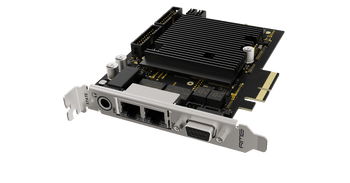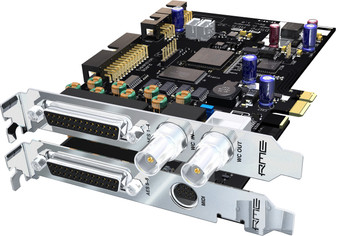Description
HDSPe RayDAT is a multi-channel, multi-format and multi-task tool in stunning professional quality, the ideal solution from recording up to the final mastering. For the first time, even SPDIF (phono) and AES/EBU (XLR) are simultaneously operational due to separated hardware and record/playback devices. RayDAT offers no less than 4 x ADAT optical I/O, SPDIF I/O and AES/EBU I/O. That's a whopping 36 channels of inputs and outputs. On top, there are 2 MIDI I/Os and TotalMix, RME's unsurpassed DSP-based real-time mixer/router, with hardware-calculated level metering and complete MIDI remote capability. HDSPe RayDAT also supports the optional TCO for synchronization to timecode (LTC/video).
Internal ADAT inputs and outputs allow to add up to two TDIF ports directly inside the computer via RME's optional expansion boards.
HDSPe RayDAT is the newly developed PCI Express version of the HDSP 9652. A genuine PCI Express core consequently takes full advantage of the new format, achieving significant performance gains in multitrack audio. Thanks to RME's secure flash update technology, firmware improvements, adjustments, and bugfixes can be installed easily at any time.
Features
- 4 x ADAT digital I/O, supporting 192 kHz via S/MUX4 operation
- 1 x SPDIF digital I/O, 192 kHz-capable
- 1 x AES/EBU digital I/O, 192 kHz-capable
- 2 x MIDI I/O, 32 channels high-speed MIDI via breakout cable
- Up to 36 inputs and 36 outputs can be used simultaneously!
- DIGICheck, RME's unique metering- and analysing tool
- TotalMix: 2592 channel mixer with 42 bit internal resolution
- Native PCI Express - no PCI to PCI Express bridge used
- S/MUX poured in hardware: 16 channels 24-bit/96kHz for record and playback on ADAT optical
- HDSPe RayDAT includes SteadyClockTM, RME's own clock technology, combining professional features like maximum
- jitter suppression at full varipitch capabilities and software controlled sample rates.
Connectivity
- 36 Inputs / 36 Outputs
- 4 x ADAT I/O (up to 192 kHz via S/MUX4)
- 1 x AES/EBU I/O (192 kHz)
- 1 x SPDIF I/O (192 kHZ)
- 2 x MIDI I/O
- TotalMix
- optional: Time Code Option (TCO)
- optional: Expansion Board WCM
- optional: Expansion Board TEB
HDSPe RayDAT includes SteadyClockTM, RME's own clock technology, combining professional features like maximum jitter suppression at full varipitch capabilities and software controlled sample rates.
Included software:
DIGICheck for Windows: Spectral Analyser, professional level meter for 2, 8, or 36 channels, Vector Audio Scope, various other audio analysis tools.
Drivers: Windows 2000/XP/Vista/7/64 (full ASIO multi-client operation of WDM, GSIF 2.1 and ASIO 2.0), Mac OS X Intel (Core Audio and Core MIDI).
Settings
Just click on the hammer symbol in the systray of the taskbar and the settings dialog of the HDSPe RayDAT comes up. The clear structured, easy to understand window plus the unique informative status windows for input signal, clock mode, sample rate and time code make your work with the card to a real pleasure. With a simple mouse click you gain access to the full power of your card.
When working with several digital sources it is not only necessary that these are all properly locked, they also have to be totally synchronized. Else drop outs and crackling occurs. RME's exclusive SyncCheck © checks all input signals. In clock mode Master the synchronous operation to the internal clock is checked. This outstanding and unique technology helps to find errors immediately. The actual state of each input is displayed in the settings dialog.
RME's unique SyncCheck and AutoSync technology has evolved into the new Intelligent Clock Control (ICC) of the HDSPe system. HDSPe RayDAT measures and displayes the frequency of all clock sources. Even word clock! Based on validity and current sample rate the system then decides which clock source should be used - fully automated and performed in hardware. With this the HDSPe system offers the most easiest handling of the present clocks, although having a lot digital inputs, plus the most advanced support when configuring the clock setup.
Accessories
- Digital breakout cable, AES/EBU & SPDIF (BO968)
- MIDI breakout cable (BOHDSP9652MIDI)
System Requirements
- Windows XP or higher, Mac OS X Intel (10.4.8 or higher)
- PCI Express Interface: one free PCI Express slot, 1 lane, version 1.1
Specifications
Technical Data
- Supported sample frequencies: Internally 32, 44.1, 48, 64, 88.2, 96, 176.4, 192 kHz. Externally 28 kHz - 200 kHz.
- 8 buffer sizes/latencies available: 0.7 ms, 1.5 ms, 3 ms, 6 ms, 12 ms, 23 ms, 46 ms, 93 ms
- All settings changeable in realtime
- Automatic and intelligent master/slave clock control
- Enhanced Mixed mode: All inputs and outputs simultaneously operational
- Unsurpassed Bitclock PLL (audio synchronization) in ADAT mode
- TMS (Track Marker Support): Supports CD/DAT start-IDs and the read out of CD subcode
- DIGICheck, RME's ultimate measurement, analysis and test tool
- Unique status windows for record and playback, showing mode and sample
- Super low jitter design: < 1 ns in all clock modes
Digital Inputs
AES/EBU
- 1 x XLR, transformer-balanced, galvanically isolated, according to AES3-1992
- High-sensitivity input stage (< 0.3 Vpp)
- SPDIF compatible (IEC 60958)
- Accepts Consumer and Professional format, copy protection will be ignored
- Lock range: 28 kHz – 200 kHz
- Jitter suppression: > 30 dB (2.4 kHz)
- Jitter when synced to input signal: < 1 ns
SPDIF
- 1 x RCA, transformer-balanced, according to IEC 60958
- High-sensitivity input stage (< 0.3 Vpp)
- AES/EBU compatible (AES3-1992)
- Accepts Consumer and Professional format, copy protection will be ignored
- Lock range: 28 kHz – 200 kHz
- Jitter suppression: > 30 dB (2.4 kHz)
- Jitter when synced to input signal: < 3 ns
ADAT Optical
- 4 x TOSLINK, format according to Alesis specification
- Standard: 32 channels 24 bit, up to 48 kHz
- Double Speed (S/MUX): 16 channels 24 bit 96 kHz Quad Speed (S/MUX4): 8 channels 24 bit 192 kHz
- Bitclock PLL ensures perfect synchronisation even in varispeed operation Lock range: 31.5 kHz – 50 kHz
- Lock range: 31.5 kHz – 50 kHz
- Jitter suppression: > 30 dB (2.4 kHz)
- Jitter when synced to input signal: < 1 ns
Word Clock (optional)
- BNC, not terminated (10 kOhm)
- Automatic Double Speed detection and internal conversion to Single Speed
- Not affected by DC-offsets within the network
- Overvoltage protection
- Level range: 1.0 Vpp – 5.6 Vpp
- Lock Range: 28 kHz – 200 kHz
- Jitter suppression: > 30 dB (2.4 kHz)
- Jitter when synced to input signal: < 3 ns
Digital Outputs
AES/EBU
- 1 x XLR, transformer-balanced, galvanically isolated, according to AES3-1992
- Output level 4.0 Vpp
- Format Professional according to AES3-1992 Amendment 4
- Single Wire mode, sample rate 28 kHz up to 200 kHz
SPDIF
- 1 x RCA, transformer-balanced, according to IEC 60958
- Output level Professional 2.3 Vpp, Consumer 1.0 Vpp
- Format Professional according to AES3-1992 Amendment 4
- Format Consumer SPDIF according to IEC 60958
- Single Wire mode, sample rate 28 kHz up to 200 kHz
ADAT
- 4 x TOSLINK, format according to Alesis specification
- Standard: 32 channels 24 bit, up to 48 kHz
- Double Speed (S/MUX): 16 channels 24 bit 96 kHz
- Quad Speed (S/MUX4): 8 channels 24 bit 192 kHz
Word Clock (optional)
- BNC
- Max. output voltage: 5 Vpp
- Output voltage @ 75 Ohm termination: 4.0 Vpp
- Output impedance: 10 Ohm
- Frequency range: 28 kHz – 200 kHzDigital
Digital
- Clocks: Internal, ADAT In, SPDIF In, AES In, optional Word clock In, Video In and LTC In
- Low Jitter Design: < 1 ns in PLL mode, all inputs
- Internal clock: 800 ps Jitter, Random Spread Spectrum
- Jitter suppression of external clocks: > 30 dB (2.4 kHz)
- PLL ensures zero dropout, even at more than 100 ns jitter
- Additional Digital Bitclock PLL for trouble-free varispeed ADAT operation
- Supported sample rates: 28 kHz up to 200 kHz
- Compliant with PCI Express Base Specification v1.1
- 1-Lane PCI Express Endpoint device (no PCI Express to PCI Bridge)
- 2.5 Gbps line speed
- Packet-based full-duplex communication (up to 500 MB/s transfer rate)
MIDI
- 2 x MIDI I/O via 5-pin DIN jacks
- PCIe bus based hi-speed operation
- Separate 128 byte FIFO for input and output
- MIDI state machine in hardware for reduced interrupt request load









